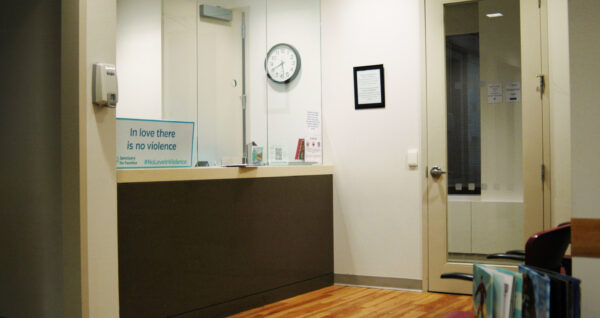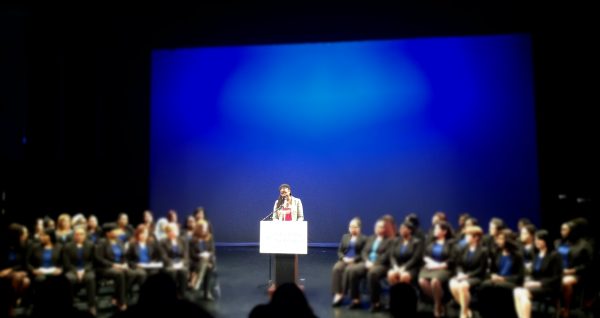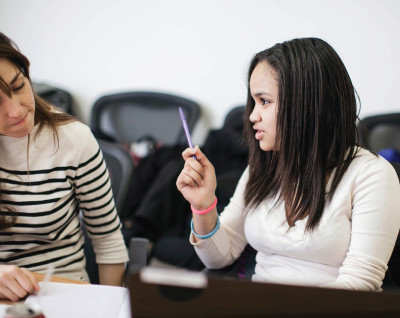Learn more about the future of our services in the year ahead.
As New York continues to recover from the pandemic, Sanctuary is preparing for a new era of hybrid service provision — one that will better meet the needs of survivors living across New York’s five boroughs.
When the City went into lockdown in March 2020, we shifted our legal and clinical services and career readiness training to virtual platforms. Our social workers conducted counseling sessions through a telehealth platform, our Economic Empowerment Program shifted training to Zoom, and when the courts resumed hearings our attorneys represented survivors through Skype and Zoom. Of course not all services could be offered virtually. Sanctuary staff kept our five shelters open throughout the pandemic, supporting survivors and ensuring a clean environment for our residents.
Learn more about how we adapted our services here >
The changes we made across our programs revealed new opportunities for our work with adult and child survivors of gender violence. Learn what’s happening in the months ahead and how we plan to integrate our current virtual services with our traditional in-person support.
Office Re-Openings
Manhattan Office – Confidential Location
Our Manhattan Office is open for scheduled appointments Monday through Friday, 9 am – 5 pm, on a case by case basis. Availability for in-person meetings will increase after Labor Day (Monday, September 6th). Please call 212.349.6009 or your Sanctuary point person to schedule an appointment.
Family Justice Centers
While Sanctuary’s shelters and Manhattan Office have remained open throughout the pandemic, New York City’s Family Justice Centers (FJCs) have largely operated virtually. The FJCs have traditionally provided valuable and accessible comprehensive services, particularly to survivors who prefer to drop in rather than make an appointment in advance. The Mayor’s Office to End Domestic and Gender-Based Violence opened the Manhattan FJC last September for limited appointments two days a week. The other FJCs are re-opening on a limited basis as follows:
- Manhattan FJC – The MFJC ramped up its on-site staffing and appointment capacity in early June. The MFJC is open on Monday and Friday during phase 2 of the reopening plan.
- Staten Island FJC – The SIFJC opened its doors on Tuesday, June 8th for client appointments only. The SIFJC is open on Tuesday and Thursday during phase 2 of the FJC reopening plan.
- Queens FJC – The Queens FJC opened its doors on Tuesday, July 6th for appointments only. The QFJC is open on Tuesday and Thursdays during phase 2 of the FJC reopening plan.
- Brooklyn FJC- The Brooklyn FJC opened its doors on Wednesday, August 4th for appointments only. The BKFJC will be open on Wednesday and Thursdays during phase 2 of the FJC reopening plan.
- Bronx FJC – The Bronx FJC will open its doors in August for appointments only on Tuesday and Thursday. The opening date is still to be determined.
EMPOWER Center
The EMPOWER Center remains open for virtual services and scheduled appointments only. To make an appointment, please call 212.238.4906.
Future of our services
Economic Empowerment
Before to the pandemic, Economic Empowerment Program (EEP) participants were expected to attend in-person classes at our confidential Manhattan office daily. Our computer labs, onsite childcare and prepaid MetroCards made this program accessible but for many, the commute added an extra layer of complexity to participants’ busy lives. The program was also especially challenging for those who did not have access to a computer or WiFi at home but wanted extra time to practice the skills they were building. The lock-down led Sanctuary to shift EEP online and provide participants with the necessary technology. Now, with generous support from Mobile Citizen for low-cost internet and long-term funding for laptops in the works, we plan to continue offering EEP as a hybrid of Zoom and in-person classes starting this fall. By providing program participants, and by extension their families, with technology to close the digital divide, greater flexibility, and the community that has always set EEP apart, we believe we can better support survivors on their professional journey.
If you would like to learn more about our Fall 2021 Economic Empowerment Program, please email Info@sffny.org
Legal Representation
New York State courts have reopened with most cases continuing to be heard virtually through Microsoft Teams. The shift to virtual court proceedings has revealed several benefits. Survivors save the time and money they would typically spend on childcare, time off from work, and/or the cost of the commute with the added benefit of not having to see or be near their abusive partner in court. While the future of court proceedings has yet to be determined, we expect virtual hearings to become a permanent option.
Family Court: Already-existing cases are continuing in the borough Family Courts where they started however newly filed cases that require immediate judicial attention can now be filed in a City-wide virtual court.
Immigration Court: Immigration Courts remain open. USCIS interviews and appointments have resumed. Non-detained removal defense cases resumed July 6, 2021.
Order of Protection (Family and Criminal): All Temporary Orders of Protection are continued until the next time the case is back in court.
Pro Bono Support: In April 2021, we launched a web-portal for pro bono attorneys to access sample documents, educational guides and a variety of other materials to help them with pro bono cases. Before the portal, these materials were typically shared on an individual, case-by-case basis by the supervising Sanctuary attorney. The launch of the portal makes it easier for our partners to learn the intricacies of gender violence cases and trauma-informed representation while freeing up time for our attorneys to provide oversight. Active pro bono attorneys can request access here.
Counseling
Sanctuary counselors will continue to provide counseling sessions to adults, children, and families through a HIPAA compliant telehealth platform with expanded availability for in-person counseling sessions beginning September 6th. As with many of our other services, counselors have found the shift to virtual services enables clients to attend sessions with more regularity because they do not have to worry about the commute or childcare. Virtual therapy, however, comes with several significant challenges including access to adequate technology and privacy, and the difficulty of building trust without the intimacy of in-person interaction. Read the reflections of our Children and Family counselors on virtual counseling here.
Housing and Shelter
Governor Cuomo has extended the moratorium on COVID-related residential and commercial evictions and foreclosure proceedings for those filing a hardship declaration until August 31, 2021. While Sanctuary’s shelters have remained open throughout the pandemic, our staff have continued working with survivors to secure permanent housing and relief through the Emergency Rental Assistance Program.
Volunteer and In-Kind
Sanctuary is continuing to limit the number of individuals entering our confidential Manhattan Office. Please check back for updates and volunteer opportunities in August. If you would like to support survivors with material or in-kind donations, please browse our Amazon Wish List. The items listed are urgently needed by families visiting our offices and staying in our shelters.



